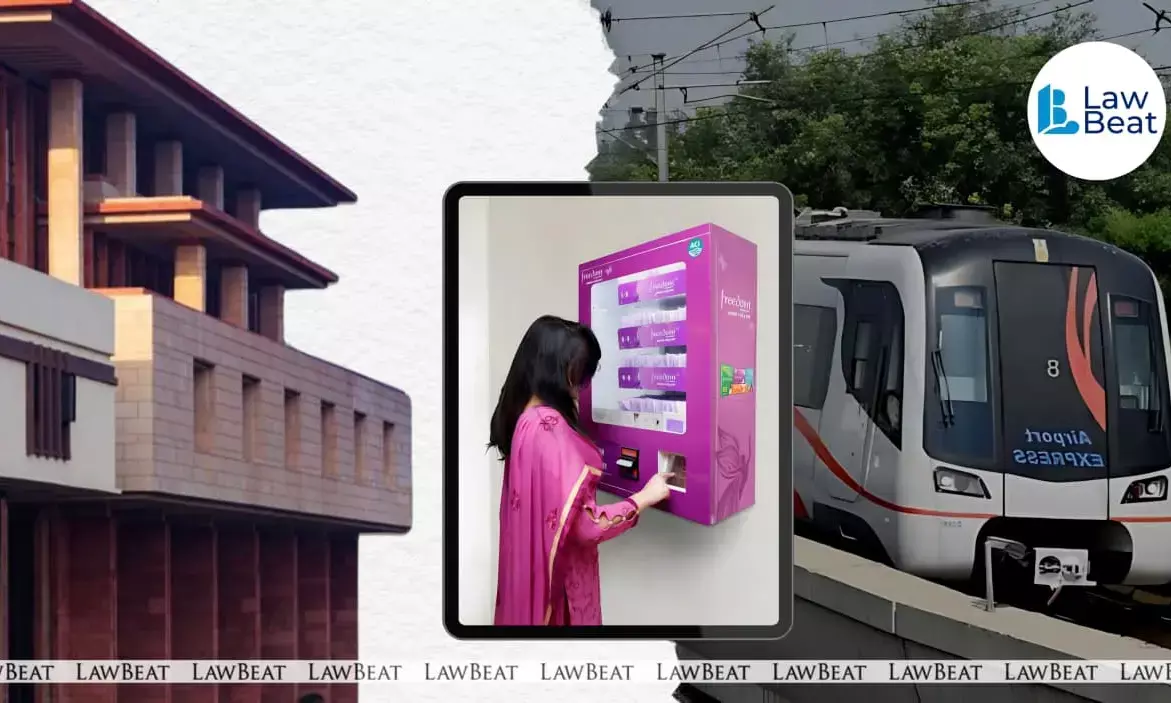Delhi HC Issues Notice to DMRC in PIL over "Lack of" Sanitary Vending Machines at Metro Toilets

The Delhi High Court on Wednesday, August 13, 2025, issued notice to the Delhi Metro Rail Corporation (DMRC) in a Public Interest Litigation (PIL) alleging the absence of sanitary pad vending machines in metro station toilets across the national capital.
A division bench of Chief Justice D.K. Upadhyaya and Justice Tushar Rao Gedela issued notice to all respondents, including the Delhi Metro Rail Corporation (DMRC), the Delhi Government, the Ministry of Women and Child Development, the Ministry of Housing and Urban Affairs, and the Delhi Commission for Women. The bench also directed the respondents to file their responses within two weeks.
Filed by Advocate Nikhil Goyal, the PIL sought directions to the respondents to fulfil their constitutional obligation to install sanitary pad vending machines and disposal units in all women’s toilets at Delhi Metro stations.
"This Public Interest Litigation 1s filed under Article 226 of the Constitution of India to address the gross inadequacy and non-functionality of sanitary pad vending machines across Delhi Metro stations, which severely impacts the dignity, health, and equality of women commuters," the plea stated.
Despite over 30–35 lakh women using the Delhi Metro daily, the plea noted that only 14 out of 286 stations have sanitary pad vending machines, of which merely 5–6 are functional, largely due to efforts by NGOs.
Arguing that the absence of basic menstrual hygiene infrastructure violates women’s fundamental rights, the plea added, "This PIL in the interest of public welfare, particularly for women and marginalized commuters, seeking judicial intervention to direct the respondents to ensure the installation, maintenance, and accessibility of sanitary pad vending machines and grievance redressal mechanisms across all Delhi Metro stations."
Stressing that menstruation is a natural, urgent, and unpredictable biological process, the plea stated that the absence of sanitary products in public toilets causes distress, stigma, and health risks to women commuters. It added, "That in a reported incident from 2007, a woman faced public humiliation and in Panic Condition due to blood stains during an unexpected period episode at a Delhi Metro station, highlighting the trauma caused by such infrastructural neglect."
While the Delhi Metro offers seat reservations and separate coaches for women as a form of gender-inclusive policy, this gesture, the plea said, cannot offset the failure to provide basic menstrual hygiene facilities. It added that the absence of sanitary napkin vending machines in women’s toilets effectively restricts the mobility of women during menstruation, which is an unpredictable and urgent health condition.
"Such neglect undermines the very purpose of gender-based reservations, which is to promote safe, dignified, and equal access to public transport. Symbolic provisions like reserved seating must be complemented by concrete measures that uphold the health and dignity of women commuters. The liability of the State to ensure menstrual hygiene cannot be waived or diminished by offering partial concessions," the plea stated.
Emphasising that the 'Right to Sanitation' is a fundamental human right, the plea asserted that without ensuring the availability of sanitation facilities for women, particularly in public spaces like the Delhi Metro, the recognition of this right becomes hollow an ineffective. Merely acknowledging sanitation as a right is insufficient unless it is backed by tangible infrastructure and inclusive policies, the plea read.
Accordingly, the plea sought directions to the respondents to formulate a comprehensive menstrual hygiene policy for public transport systems and to establish a monitoring and grievance redressal mechanism for menstrual health-related complaints in the Delhi Metro.
Case Title: NIKHIL GOYAL VERSUS DELHI METRO RAIL CORPORATION AND ORS
Hearing Date: 13 August 2025
Bench: Chief Justice DK Upadhyaya and Justice Tushar Rao Gedela
